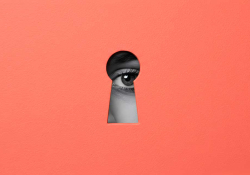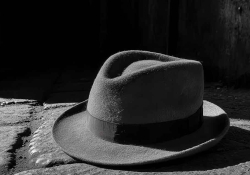The Story of a Dreamy Sky

A Sri Lankan village’s sole film critic tells the story of Gamini: “My generation might be the last to remember the Sri Lankan movie maniacs like him. So, I must tell you his story.”
My sister reported that the oldest movie maniac in our village has indeed become insane. Because she knows the cinematic kinship between Gamini and me, she must have picked this news as the headline of her briefing of the last few months’ events.
Everyone calls him Gamini, no one knows his real name. “Everyone calls me Gamini,” he would reply to anyone who asked his name, whether it was the village administration official or the police. When he found the situation right to do a little bit of acting, he would act out and say a few lines from the famous actor Gamini Fonseka’s part in the movie Desert. So, his first name is Gamini, and the last would be the part he acts out.
My generation might be the last to remember the Sri Lankan movie maniacs like him. So, I must tell you his story along with a few other old stories traced from my memory.
Since the day I moved to my wife’s home in Mawathagama, I have missed witnessing some twenty years of Gamini’s evolution as a movie maniac. Still, no one else qualifies to tell his story better than me. The fact that I am the only film critic in our village is just one of many reasons for that. Without any kinship term, I am going to call him by his name, like how we talk about famous movie stars by their names despite their age.
Around twenty years before moving to Mawathagama, I went back to our village as a schoolteacher after finishing my higher education in the city. Even then, Gamini’s love for movies remained the same. It was in the late nineties. By then, he only watched movies on the TV. “This is nothing like seeing movies in the theatre, my friend,” he said to me once.
“You know those perverts who watch the couples in parks from a tiny peephole made in a newspaper? That’s exactly how it feels like to watch movies from the TV,” he continued.
I even used that statement in an article I wrote for a newspaper. Finding a chance to talk to him was a teachable moment for me. I often used quotes from his collection of fifty- cents magazines on movie songs from the ’70s. Although by this time, he didn’t see as many movies as he had once used to, his stock of memories was still very much alive. I even acknowledged him in one of my articles: “My sincere thanks to Mr. ___ who provided information for this article.” He took pleasure in taking it with him everywhere he went and showing it to people. He even read it aloud, adding “within brackets Gamini” after his name. Later he became someone who told the stories of the movies he’d once seen to the people at the village grocery store.
He was a fan-hero who either took the bus or rode the bicycle or else walked miles and miles on foot in pitch-dark to see movies.
But he wasn’t like that before. He was a fan-hero who either took the bus or rode the bicycle or else walked miles and miles on foot in pitch-dark to see movies. When we were little, Gamini’s bicycle would go past our house at least two nights a week, making a rattling noise like kreessa-rass-kreessa-rass.
Looking back, hearing this kreessa-rass at night amidst the cries of curlews feels like a scene out of a movie. “Gamini’s going home only now,” Mother would say, sifting or kneading the flour. The hoppers and string-hoppers that were made at our house in the morning were provided to every shop in the village. Although I didn’t stay up very late, I had this habit of waking after the first round of sleep to pee before the next. Usually around that time, either my mother or father, who used to sleep in the living room, would be awake. I wondered many times if they stayed up late on purpose in the evenings we heard Gamini’s kreessa-rass paddling to the town.
One evening on his way to the movies, he stopped by to say to Mother, “Big Sister Vimala, keep thirty string-hoppers for me tonight,” and then his kreessa-rass slithered toward the town. Another day, I heard him narrating a story of a movie to Father at the gate. Some nights, he would come and talk to my parents on the porch. Half asleep, I would hear him speak. His stories would enter my dreams while trying to fall into my second round of sleep for the night. If the teachers want to teach something to be embedded in the subconscious mind of the students, they should do it while they are about to fall asleep. The lessons would then get absorbed into places even the children themselves are unaware of and take root. So, my cinema teacher is Gamini, the movie maniac in our village. The Gamini, who has now become insane.
So, my cinema teacher is Gamini, the movie maniac in our village. The Gamini, who has now become insane.
I still remember the day his love for the movies got absorbed into my subconscious mind. As a child, I often suffered from urinary problems. It was one of those nights. Like usual, I woke up from my first round of sleep, went outside, took my penis out, and tried to pee. A drop would almost come to the tip of the penis and stop. The burning sensation was unbearable. Mother brought a big cooking pot filled with water and held it between my legs. I dipped my penis in water. Sometimes she would dissolve a spoonful of sugar in a glass of water and let me drink it. This night, none of these tricks worked. It was as if a cobra pepper was hanging between my legs.
Just as I was looking for something to take my mind off of my penis, we heard the kreessa-rass. That sound was so pleasing to my ear that for a second I felt as if I almost attained nirvana. I listened to his bicycle paddling toward our house. He’d start talking about the movie he’d seen tonight. And I was sure it wasn’t going to be about a boy suffering urinary problems. That’d be enough to divert my mind.
The kreessa-rass stopped at our gate.
“Gamini, why are you late tonight?” Father asked him.
“They screened Sivaji Ganesan’s Thirisoolam. It took about three hours with the ads from the coming movies. What a show it was! Its songs and dances were the best.”
“Yes, the guy can dance well,” Father replied, trying to get Gamini to talk more about it.
Once his bicycle stopped, the light from the dynamo stopped, too. We all were in dark. I imagined how Gamini’s face must be talking. For a moment, I forgot all about my urinary problems. Perhaps Gamini who saw movies almost every night might never get urinary problems, I wondered.
“Now, what’s wrong with Chaminda?” Gamini asked Mother.
“He has trouble peeing again,” Mother replied.
“No use in dipping that thing in the pot. Wait,” he said, parking his bicycle by the Jackfruit tree.
“There’s no end to it until you pass the urine. Big Sister, have you got any neeramulliya plants in the house?” he asked Mother.
Gamini, who was in dark so far and whose picture I had imagined in the small screen of my mind for all this time, came to our porch, entering the ring of light that came from the lamp.
“Chaminda, it might hurt a little. But don’t hold it. Let it go as it comes,” he said. “Sister, can you get me batteries for the flashlight?”
We didn’t use the flashlight often. The batteries cost money, so we always kept it dismembered. Or else, the flashlight batteries were used for the radio.
Father put the batteries into the flashlight and managed to get some light out of it. I waited with my penis on the pot.
“This flashlight is like the projector at Jupiter hall. Even the orange king coconuts look green in this light,” Gamini said while aiming the light to the top of the king coconut trees. I whickered, a drop of pee left my penis. What a relief! But behind that relief crawled in an unbearable burning sensation.
“Those trees are too tall now. Otherwise, I’d have plucked those coconuts,” Father said as if to provide an excuse for having so many coconuts left in the trees.
Gamini aimed the flashlight at Mother and me.
“Brother, can you get me a loop? And sister, please bring a sarong. Chaminda, aren’t you ashamed, man? How can you take that fat bandicoot out in front of a mother? In the time of the kings, the guys of your age brought princesses from India,” he started talking to all of us in the same breath.
Mother took the pot away. I was slightly ashamed. And Gamini turned the flashlight away from me. My penis felt heavy. As if a beautiful princess was swinging on it.
“This sarong stinks. I can’t even hold it close to my nose,” Gamini said, giggling.
“Stop your lying! I just washed it this evening,” Mother responded, pretending to be angry.
I wondered if he was turning this night into a comic scene in a movie to get my mind away from the pain.
Gamini fastened the loop around his feet, making sure he had a tight grip. Then, we heard the loop going up the tree, brushing it against the trunk, making a crease-crease. And Father held the projector of the Jupiter cinema up at the tree, while I saw the scene of Gamini reaching the king coconuts projected on the neck of the tree. I put my penis inside my pants, not letting the princess swing on it anymore. I looked at the house to make sure my sisters were still asleep.
“You should’ve seen Sivaji’s fighting scenes . . .” Gamini said, twisting the king coconuts from the bunch.
He climbed down the tree with two king coconuts shoved up his armpits. Two more hung from his mouth, he was biting into their stalks. He could have easily let the coconuts fall down, but the tree was too tall. The coconuts would have cracked open no sooner than they hit the ground.
That moment, Uncle Gamini looked not just like a hero out of a movie, but also a hero in the real world.
He cracked open the king coconuts, poured the water into the aluminum pitcher Mother had brought, and let me drink the king coconut water out of it. “Here, drink.” And I did.
“Don’t sip. Gulp it down.”
I started making a gulping sound from my mouth, wanting to pay him my gratitude by making him laugh a little bit for entertaining us all this time.
“There now, the boy’s acting silly, too,” Mother said, pretending to be mildly annoyed.
“Do you want to eat some rice?” she asked from Gamini.
He remained silent.
“Have you had dinner? It’s almost two,” Mother asked again.
“I had a vegetable roti with plain tea,” Gamini replied.
“Eat some rice, brother,” Father insisted.
Mother came from the kitchen with a plateful of rice topped with coconut sambol, jackfruit, and mudfish curries.
“The sambol tastes great,” Gamini said while eating.
The sight of him eating made me happy. I sensed a chill running down my spine, and then the drops of relief flowed through my urinary glands. I went outside, took my penis out, and peed, making a big pool.
“Huh, if Neil Morayas sees him pee, he’d take the boy for one of his movies. Didn’t I say already, his thing looks like a fat bandicoot,” Gamini said.
“What’s the movie that starts with boys peeing in the opening scene?” Father asked.
“Three boys. But all three couldn’t pee as much as this guy peed tonight. Three-way Junction. Directed by Mahagama Sekara. Based on his own novel. Screenplay by Mahagama Sekara himself. Joe Abeywickrama’s acting was terrific!” He kept saying as if a radio host reviewing a movie.
I sat down on the porch to listen to more movie talk. By then I was rejoicing from the relief of emptying my bladder. It was as if I had just blown fire out of it.
“Why don’t you go and sleep without staring at the adults’ mouths. You have school tomorrow,” Mother ordered me. I realized that I no longer belonged to the adults’ world.
“What school is there tomorrow? Today’s Friday. That’s why they screened a long movie tonight,” Gamini defended me.
He was washing the plate, having finished dinner. Mother gave me a long frown. I stood up and went to my room.
“Tell the boy to drink enough water during the day. It can come again. I’ll bring some neeramulliya leaves some time, they’re good for urinary problems. I’m leaving. Got to milk the cows tomorrow.”
Lying on the bed, I listened to his kreessa-rass coming from his pedals like a lullaby.
* * *
The rest of that night was filled with a beautiful movie scene. Uncle Gunasekara from our village was the director. It was being filmed in his backyard. The traditional Singhalese tiled roof and the pillars in his porch were captured clearly on the camera. He was talking under a tree with the famous actor Gamini Fonseka. They talked casually like friends. Gamini Fonseka then walked toward Sumit, Vijit, and me. He shook hands with us, taking his sunglasses off.
“Keep peeing as Mr. Gunasekara asked you to, okay? I will come from that side with Malini. Keep peeing until I save you guys,” the great actor Gamini Fonseka advised us.
“You young man, your fat bandicoot is not like their little mice. Don’t hesitate to take it out with pride, okay?” Mr. Fonseka took me aside and gave me special instructions.
Once Uncle Gunasekara shouted “Acting,” we took our penises out, looked at each other’s as if we were briefly comparing them with each other’s, shook them a little, and released the orders. The urine started gushing out from them. My penis got bigger than others’. With its foreskin pulled back, it looked like a soldier wearing a helmet. Uncle Gunasekara’s garden first became a pool of pee, then a lake, and then a reservoir of pee, like the great Parakrama Samudra. Finally, it became an ocean of pee. While we were about to drown in that ocean, we heard the sound of the boat. Gamini Fonseka was driving it, he was in a very short swim trunk. Muscles in his shirtless body were gleaming in the sun. He had beautiful chest hair. “Oh look, the guys are that way,” the famous actress Malini said to Gamini. She was in a swimsuit, her fair thighs exposed.
The boat sailed in a circle around us and stopped. Gamini threw a rope at us. The rescue mission was successful, and we were taken aboard a split second before the violent waves of the pee ocean drowned us in it. Malini welcomed us to the boat with a hug and kiss on the cheek. The explosion that took place when my cheek accidentally brushed against her breasts threw me out to Tushita heaven. When the director shouted, “Cut cut” I woke up in heaven.
Instead of an ocean of pee, there was a stain of thick fluid in my pants.
I imagined how I’d give the news to Ajanta and Sunanda on Monday: “Me too.” Their voices started changing only recently as well.
“Now is a good time to get some posters of actresses like Malini, Veena, Geeta, Swarna, Anoja, and Sabeetha,” Ajanta would say.
* * *
That was how the movie maniac Gamini contributed in pushing me into my teenage years. Gamini’s rescue mission to save me from my urinary problems around one in the morning gave me my first wet dream along with the first motion picture produced in my mind’s theatre. Why do I still remember this dream I saw at fourteen? I pictured it over and over again on the same day as well as in the years to come. In its later versions, it had Gamini’s kreessa-rass and the king coconut scene as well.
That was how the movie maniac Gamini contributed in pushing me into my teenage years.
This dream even resulted in my career as a film critic later in life.
Gamini, who pushed me toward the world of complete manhood as well as to the aesthetic world of cinematic fandom overnight, came over with neeramulliya leaves a few days later.
“Dry the leaves in the sun first. Boil them with water and let the boy drink it. After a few days, he’ll get completely better. This little sister neeramulliya is the one who saved me from my pains, too. I had the same problem every harvesting season,” Gamini instructed Mother.
She was feeding ginisiriya leaves to the doe.
“It’s time you found a little sister to save you from other kinds of pains, too. Don’t you meet girls at the theatre?” Mother asked, using his own metaphor to show her concerns.
“There’s plenty of little sisters for that. Big sisters can do the saving, too, if they want.”
“Stop being stupid,” Mother gestured as if to hit him with a ginisiriya branch.
“If nothing else works, I’d buy a doe,” Gamini said, seating himself near the betel container.
“Shut your trap,” Mother held a ginisiriya branch, covering the doe that had started to pee.
“What, I’m just joking,” Gamini said, cutting an areca nut.
“Just joking? The boy’s big now,” Mothered replied in a low voice.
“Chaminda, what’s the time?” Gamini asked, turning toward the house. He knew I was listening to them from the window.
“Four-thirty.”
“Ah, I must leave. Tuck-tick-tuk, Tuck-tick-tuk, Tuck-tick-tuk.” He started singing, tapping the betel container, looking at Mother. She didn’t seem to get this strange tuck-tick-tuk signal he was giving. To me, it looked like he was making an advance to her.
“What are you trying to say now?” Mother said with a frown.
“Nothing. They’re showing Tak-Tik-Tuk today. Directed by Yasapalitha Nanayakkara,” Gamini replied, and started to sing a song from the movie, “Everywhere I go, Sweetie, I am looking for you. I wish I’d find you my angel, my beautiful, as fast as the tak tik tuks go by . . .”
Gamini had made a dholki drum out of the betel container. The song was also being played on the radio.
“Starring Wije, Sumana, Joe, Rukmani, and Dommie. Directed by Yasapalitha. Why don’t you come, too? I’ll drop you off from my bicycle.” I heard him say while I was trying my best not to laugh out loud from the room.
“Nonsense. Come and eat some rice on your way home,” Mother said in response and came inside. I pretended to be studying.
“Tell brother not to eat till I come. I’m bringing some hooch. The movie starts at six-thirty, so it won’t get late.” And I heard the kreessa-rass slithering away. I was tapping the desk, singing tak tik tuk.
* * *
Uncle Gamini never married. He cultivated the land in Damunugolla and lived in the old ramshackle house of his dead parents. He is my mother’s cousin, her uncle’s son. He spent the income from the land and milking his cows on his love for the cinema. His love for alcohol was not a serious one, but a controlled one. He must have learned it from the movies. He drank like heroes. Not like villains. I didn’t feel like looking into his love for women. I must have feared my potential findings. He must have been in love with women as a civilized man. Whoever those women might have been, they must have enjoyed his love, they must have loved him back, too. Those humble love stories must be closer to the movies than to the real world.
He drank like heroes. Not like villains.
He was always clean and well dressed. But he paddled the same old Hercules kreessa-rass. Not that he didn’t have enough money to repair it or buy a new one. And he never saw movies during the day. Be it Jupiter, New Cinema, Imperial, Modern, Cinexpo, he always visited these movie theatres at night. He paddled the bicycle to Wellawa, parked it behind Mr. Sattar’s shop, took the bus to Kurunegala, and paddled the kreessa-rass back to the village. If he missed the bus from Kurunegala, he would buy a bottle of cheap arrack, put it in his pants pocket, and walk back to Wellawa, taking small sips from the bottle. That was how Gamini was dedicated to the cinema.
But once, he went for the two-thirty show. It was because he took me with him. It was also the first time I saw a film in color. The film was Let’s Meet Again. Directed by Yasapalitha. We took the bus coming from Budanapitiya that goes through our village. Why should the boy suffer in the kreessa-rass, he must have thought.
Although I was just turning fifteen, I came out of the hall as if I’d reached full adulthood. I felt as if I’d metamorphized into a blend of the actors Wije and Sanat, as if I’d become suddenly handsome and slightly curly-haired. A middle-aged man, even now, when I hear the song “In the Spring of a Dreamy Sky,” I’m tempted to walk like Wije, dancing. Although I’ve started to go bald, I feel like the skin of my head gets torn open and strands of hair appear like that of Wije, making me look handsome. I feel like dancing, holding the hand of a nearby Sabeetha.
I’m forever indebted to Uncle Gamini for that priceless experience.
Because we had enough time for the six-thirty bus, he took me for tea at a nearby shop. “Brother, can you get us some buns and tea?” he said to the waiter as if to show him that both of us are now grown men. As if he was Wije, and I Sanat. It was around eight when we got back to Wellawa. From there we walked back to the village, talking various things about movies. He knew by heart every bit of information about the film industry that appeared in newspapers.
I expected many more cinematic trips with him. If I had been able to, I wouldn’t have become a critic who writes occasional articles about cinema. I could even be the second famous film director from the village of Wellawa, after Siri Kularatne. Then, I might have also been the loving director of many famous actresses who’d say, “Mr. Chaminda was the one who opened the doors of the cinema to me. I love him so much.”
* * *
The fate then blew a series of attacks at Uncle Gamini. During the Black July in 1983, the theatres were burnt down. The Wijaya Art Gallery was burnt down to ashes. The most brutal attack on his humble kingdom was the murder of Wije. He returned home from Wije’s funeral, dressed in a white shirt and pants, with a mournful face. Seeing Geeta, Veena, Sabeeta, and Rita weep in real life, his heart was broken even further. The erosion caused by this event was the beginning of the collapse of his cinematic mansion. The patriots set fire to the Ceylon Transport Board buses, the state-run transport service. The state-sponsored terrorists of the government killed the nightlife of the villages like ours. The joy we looked forward every night, to hear Uncle Gamini’s kreessa-rass at one in the morning, was taken away from us. The nights that dwelled with eternal darkness and terror dawned on us. And during the day, the Tigers who set bombs inside buses frightened us. Sumith, a guy who peed with me in my dream, joined the army and died on the battlefield at Punarin.
The government who had no clue about our aesthetic nights shut our doors, locked us inside our houses, and forced us to sit in front of a picture box. And we obeyed it.
I didn’t get any more urinary problems. So, Uncle Gamini didn’t have to climb coconut trees at one in the morning anymore. We stopped waiting for him to stop by on his way back from the nine-thirty film and tell the story of the movie he’d just watched. No more buses. And no more shows after three-thirty. The funny cousin who cracks jokes at the big cousin sister and makes everyone laugh stopped visiting us. With that stopped the film songs and drumbeats of the cinema connoisseur who used to frequent our living room. And the aesthetic nights in our porch got silenced forever. The art-loving comrade of our own class whom the revolution of our generation professed to protect was perished by the revolution itself. The government who had no clue about our aesthetic nights shut our doors, locked us inside our houses, and forced us to sit in front of a picture box. And we obeyed it. When they started cutting the electricity at night, we pre-charged a car battery, connected it to the TV, and watched whatever they showed on it. And still, we haven’t moved on from those days.
Back then, it was not safe for a young man of my age to live in a village. So, Father hid me in different places and encouraged me to study. I stopped thinking about Uncle Gamini and studied for exams. And I managed to save my life from the official and unofficial army guys who arrested young men in villages. From then on, I was able to see the years pass by as a teacher and a film critic. But I wasn’t around Uncle Gamini anymore.
One night he was beaten up by the police on his way back from a kathak dance drama. Mother and I went to the hospital to see him. His face and head were bandaged in white. Although we could only see a mouth in that bandaged head, he started singing and laughing as soon as he saw us. “Singing and dancing, I am smiling through tears throughout this life . . .”
“What’s your name? They asked. Gamini, I said. Then they asked for my ID card. I gave. They checked it. Beat me. No time to explain,” he said. Although I smiled at his words, I knew I was looking at a hero who got beaten up by the police for his love for cinema.
I knew I was looking at a hero who got beaten up by the police for his love for cinema.
“Is this funny to you?” Mother asked, holding her cousin’s hand. “Acting comic like Freddie Silva in front of the police won’t do,” she advised.
“No way. Freddie’s face even makes dogs laugh,” he replied, giggling.
* * *
One day, my elder sister delivered this sad news that I’m going to tell you now. It was my fiftieth birthday. We visited her and her family in our village for a simple lunch.
“How old is Uncle Gamini now?” I asked her.
“Around sixty, they say. Nowadays, he is wearing a chicken cage on his head. He thinks he’s a chicken. He’s not in his right mind since the bastards from the police beat him up. He goes to the temple often. The monk helps him with food and everything,” my sister explained.
Then, she got a call.
“Looks like Uncle Gamini just left the temple. He’s coming this way,” she said after hanging up.
“Although every child in the village calls him uncle, to you, he’s bappa because he’s your mother’s younger male cousin,” Mother reminded us. To me, however, he’s just Gamini, like a movie star forever remembered by his name. That was how I’d always thought of him.
I got into the bike and went to Parakrama’s grocery shop. I waited for Gamini. This is the road we took to see Let’s Meet Again. The melody from “In the Spring of a Dreamy Sky” started playing in my head.
I saw Uncle Gamini walking toward me, singing. His head was covered with a chicken cage made out of a mesh net. The cage covered him down to his chest. A folded cloth was placed on his head to make the cage sit comfortably on his head. He had chosen to see the world through the mesh net of this chicken cage. He came closer, looking at me through the squares. A yellow-color piece of cloth hanging from the cage was floating in the air and obstructed his vision from time to time.
On his hand was a plastic bag.
“Uncle Gamini.”
He held the bag up in the air and said, “The monk gave me food.”
“Uncle Gamini, do you recognize me?”
He ran a finger through the squares, moved the yellow cloth aside, and looked at me.
“Huh, why not! The famous producer, Tissa Nagodavitana.”
I couldn’t speak. And he didn’t let me either.
“Tissa, my friend, I was waiting to talk to you. What are you doing with those shows?”
“Why uncle?”
“What’s with all those watermarks you send across the screen every second? It’s distracting. I even told your actor Sanat to tell you to stop it. At least don’t let them float on Malini’s face, will you?”
“Sorry, that is true. Why are you in a chicken cage, Uncle?” I asked him.
“Chicken cage?” He asked me, moving the cloth again to look at me.
“I mean you are inside this mesh net.”
“Oh, yes. You are partly responsible for that. You guys are putting squares on the screen whenever they smoke, or drink, or kiss, and even when they shake their breasts and hips. I’ve watched all those scenes without squares a long time ago. Now you’re showing us meshed Wije Kumaratungas, meshed Sanath Gunathilakes, meshed Sabeetha Pereras . . . Do you call those movies? Anyway, you don’t have to use squares anymore. I’m using my own,” he kept saying. I expected him to recognize me at some point in our conversation.
“Bappa,” I called him, my voice heavy. For a second, he stared at me as if he recognized me. And then he started talking again, “Tissa, my friend, Kalan is waiting for me. I’ll see you later.”
My eyes became moist, my vision blurred. I saw Parakrama come out of the shop and look at me and the chicken cage walking away from me.
“He might tell people that he met you. His memory comes and goes,” Parakrama said to me.
“That’s a relief!” I couldn’t help saying.
My steps felt heavy. My eyes became blurred as if a yellow-colored mesh net was covering my vision.
When I returned, if my sister or wife would say to me, “You are in a cage, too,” that would have been the best birthday present ever; the most treasured inheritance I may have received from the movie maniac named Gamini.
Translation from the Sinhalese
Editorial note: From Gedarawata Sitiyama, copyright © 2020 by Liyanage Amarakeerthi. English translation copyright © 2020 by Chamini Kulathunga.











